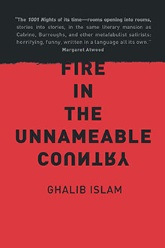Fire in the Unnameable Country
Ghalib Islam

Paperback: 464 pages Publisher: Hamish Hamilton(2014) Language: English« Book Excerpt »US: Indigo, AbebooksUK: Amazon.co.uk, Abebooks IN: Booksnclicks, Buybooks India |
This first novel by prodigiously talented Ghalib Islam, a graduate of the University of Toronto’s creative writing program, threatens on too many pages and in too many ways to bury its extravagant brilliance beneath the ruins of its over-elaborated architecture. Islam has read, and attentively assimilated, most of the 20th and 21st century’s dystopian fabulists, postmodernists and metafictionalists. It’s a who’s who of literary figures: from Gabriel Garca Marquez to Umberto Eco, from Salman Rushdie to Margaret Atwood, from Franz Kafka and George Orwell to Italo Calvino and Jorge Luis Borges — with a courteous nod to Jonathan Swift and Toni Morrison. His bold experiments — with language, with style and syntax, with sentences suddenly interrupted or lavishly extended — are often striking, but at times mannered and cumbersome. The “Unnameable Country” of the novel’s title is every country paralyzed by modern or contemporary dictatorships, oppressed by stifling bureaucracy and technological intrusion into and surveillance of everyday life. This dystopian and Orwellian thread has both a venerable history and real and immediate relevance, but in a novel in which time, history, and chronological narrative are everywhere intentionally distended, it doesn’t help the story’s constantly disrupted coherence that “the unnameable country” is a phrase repeated well over 100 times in the course of just over 440 pages. It’s symptomatic of the novel’s burgeoning excesses. Hedayat, the novel’s main narrator, tells “his” story under the shadow of ever-threatening American interventions, of the CIA, of local governments themselves stifled and strangled amidst surreal tactics of surveillance and control. The elaborated, novel-long metaphor of filmmaking, as well as of endless mirrors that constantly refract and reflect individuals’ images and identities, heighten those senses of surveillance and control. “His” story’s narration is sometimes in third person, sometimes first person, and sometimes quasi-omniscient. This splitting of narrative technique is at one level a vital representation of the novel’s inquiry into what the possibilities are for an individual voice amidst social, civil and political bedlam. The novel’s overly intricate development of another of its superstructures is via the Borgesian/Orwellian motif of “thoughtreels.” Recorded tapes of citizens’ memories and mindscapes are stored in canisters on endlessly multiplying shelves, along endlessly branching hallways, to be deciphered, decoded and interpreted by shadowy governmental divisions and subdivisions. Here, for Islam, less would have been more. Hedayat — at times magically afloat overhead, at times a subversive underground drug-runner afflicted early on by an explosive catastrophe that disfigures him and turns his hands into talons — also narrates (often backwards) the history of his own improbable family. Fathers and grandfathers have doubled names and identities — think of the Buendias in One Hundred Years of Solitude, then add raw onions, grotesque illnesses, dust, spiders, spiderwebs and innumerable small birds underfoot. And Hedayat, like several other characters in The Unnameable Country, also loves and loses love, but these touching intimacies are too often subsumed amidst the proliferating narrative chaos. Islam’s fabular political parable is splendidly ambitious, at times gorgeously written, and often wonderfully (if darkly) comic. The risk, though, is that too many readers, lost in the funhouse, might abandon The Unnameable Country halfway through, which would be a pity. Canadian literature scholar Neil Besner is provost and vice-president, academic and international at The University of Winnipeg. Reviews
|
